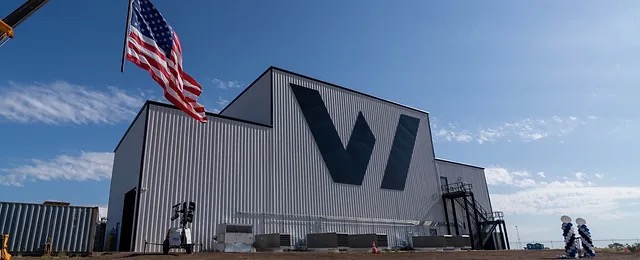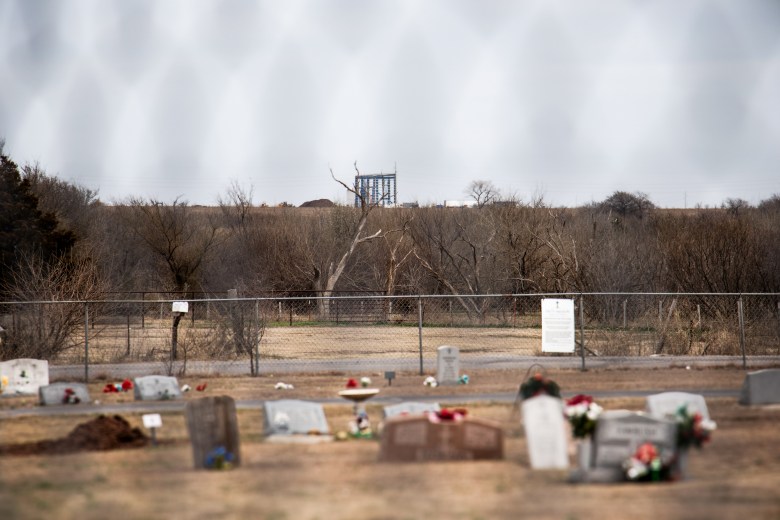LAWTON, Okla.–The U.S. currently relies on China and other foreign countries for critical minerals to produce electric vehicles and other technologies. However, recent developments by Westwin Elements in Lawton, Oklahoma–home to the nation’s first nickel and cobalt refinery–could shift the supply chain closer to home.
As these projects promise to fuel the nation’s EV future, Indigenous communities in Oklahoma are raising alarms about environmental exploitation, experimentation and greenwashing, drawing parallels to historical patterns of extractive industries targeting marginalized people and culturally significant places.
In a field outside Lawton, Oklahoma, Westwin Elements, a metals refining company, built a pilot refinery to produce a 99% pure nickel powder, a critical mineral for making electric vehicles.
The refinery looks like three large box cars stacked on each other with a giant W painted on the front. Other industrial sites, such as the Goodyear Tire and Rubber factory, Republic Paper, and Silver-Line Plastics, operate down the rocky road from the refinery.

Just beyond those industries, lies the horizon of the Wichita Mountains. And strikingly close, a cemetery surrounded by fields. Westwin’s “pilot-plant” is the first phase of the company’s plans to build a fully operational refinery that could eventually produce cobalt.
Since breaking ground in the summer of 2023, Westwin Elements has faced community protests in Lawton over its development. CEO Kaleigh Long promises to create jobs, address environmental, social, and governance issues tied to nickel and cobalt, and strengthen the U.S. critical mineral supply chain.
However, many residents remain opposed to the project, citing concerns it could negatively impact the land, water and air.
Indigenous and community resistance
For months, an Indigenous-led resistance group supported by Honor the Earth, named Westwin Resistance, has protested the refinery. The group has spoken out at city council meetings, criticizing the company and city officials for not conducting Tribal consultation and failing to ensure the refinery’s operations would be safe for the environment and community.

Recently, resistance leader Kaysa Whitley, a Kiowa and Absentee Shawnee Tribal member, pointed out on TikTok that roads near the facility are unstable and often flood, raising concerns about the safe transport of nickel feedstock to the refinery. On her account, she’s highlighted the significance of the nearby Wichita Mountains, which are a sacred site to the Kiowa, Comanche and Apache (KCA), as well as home to a wildlife refuge.
Members of the Comanche Nation are particularly alarmed about the refinery’s proximity to the historic Deyo Mission Road Baptist Church, located two miles from the plant. The church, where the first Christian conversion on Comanche land occurred, is also home to a cemetery where Comanche relatives are buried.

Margaret Morgan, a Comanche Nation citizen, told the Black Wall Street Times she fears the refinery’s potential pollution. “That’s where I grew up. A lot of my relatives are buried at that cemetery. I’m concerned for the people living near Deyo Mission,” she said.
Brandon Parker, a Comanche citizen and environmental scientist, was appointed earlier this year to advise the Kiowa, Comanche, and Apache (KCA) Tribes on Westwin’s operations in Lawton. He expressed concern about potential violations of the Native American Graves Protection and Repatriation Act.
“The area is significant, at least for Comanches. To have a large-scale or even small-scale refinery so close is concerning,” Parker said.
Tribal resolutions oppose refinery
Earlier this year, the Comanche Nation passed a resolution opposing the refinery at a Business Council meeting after former Chairman Mark Woommahvovah publicly supported it. The resolution cited Section 106 of the National Historic Preservation Act, emphasizing Tribal community input on historic preservation issues.
The Apache Tribe has also passed a resolution opposing the refinery, demanding environmental impact surveys and consultation before continuing the project. The Kiowa Tribe is in the process of adopting a similar resolution.
The refinery is on property owned by the Comanche County Industrial Authority, not on federal trust land. However, according to Warren Queton, District Seven representative of the Kiowa Nation, the land where Westwin is building is still within KCA territory defined by the 1867 Medicine Lodge Treaty.
He told the Black Wall Street Times the resolutions give the KCA the opportunity to file an injunction in court.
“We expect that our sovereign rights to protect our water and our air will be adhered to by the implementation of federal guidelines,” he said. “It’s important to note that while the [nickel] factory may not be on our federal trust property, we still have land and territory that may be affected and especially citizens.”
Concerns over lack of consultation
Although Long spent much of her childhood in Oklahoma, she said she was unaware of the land’s cultural significance or the requirement for government-to-government consultation mandated by the NHPA. She believed the City of Lawton was responsible for initiating consultation. Long said the company sent letters earlier this year to begin the process but continued with development despite claims from the KCA that they never received the letters.
Since Westwin has not received federal funding, it is not legally required to conduct consultation at this time. However, if the company begins receiving federal funds, the City of Lawton and Westwin must engage in formal Tribal consultation.
Environmental safety concerns for Westwin refinery in Lawton
Westwin plans to use the Mond process, a vapor refining method that mixes nickel feedstock with hydrogen and carbon monoxide to produce pure nickel. According to the company’s engineering team, this method is safer than other metallurgical processes. However, experts warn it carries significant risks.
Nathan Manser, a geological and mining engineering professor at Michigan Technological University, said the Lawton community’s concerns about the Westin refinery are valid because nickel-carbonyl gas is highly toxic.
“For the company producing this gas during this process, it behooves them to control it and contain it 100%. If they let that gas escape, they’re losing their entire profit margin,” Manser said.
He also noted the feedstock could contain sulfur compounds that could contaminate soil and groundwater.
“The nickel commodity chain [in the U.S.] from a sulfide-bearing ore has a lot of potential to harm the environment if not handled with care,” he said. When sulfur enters the atmosphere, it can lead to acid rain and contaminate surface water systems. Mansur explained that it can also build up in plants and animals, posing further environmental risks.
Nick Hayman, director of the Oklahoma Geological Survey, expressed confidence in the Oklahoma Department of Environmental Quality’s (ODEQ) ability to protect the community but urged leaders at Westwin to engage in Tribal consultation and to be open about safety protocols at the refinery as well as in the worst case scenario.
“It’s about starting the conversation early, having open and transparent discussions,” Hayman said. “The Tribes are the holders of interest in much of the state if not the majority. I think there’s a path forward there.”
The Black Wall Street Times reached out to Westin Elements multiple times for comment on this story. Our requests were ignored.
Distrust in regulatory oversight
Lawton residents remain skeptical of ODEQ. In an Instagram Live over the summer, Whitley criticized the agency as being reactive rather than proactive after effluent—or liquid waste— from a wastewater treatment plant was found in Cache Creek.
“[Westwin Resistance] helped bring to light that our city has been dumping partially treated effluent into our creeks,” she said. “The mayor says that ODEQ will hold [Westwin] accountable, but they’re already failing concerning our wastewater treatment plant.”
In Facebook groups, Lawton residents express concerns about where Westwin’s wastewater will go, stating the company is on its septic system. Still, the city wants to put its water in a shared system.
Lawton’s uncertain future with Westwin refinery
Refining nickel is a new venture in the U.S. Many people in Lawton don’t want to be guinea pigs for an experimental industry. While this new industry could reduce the U.S.’s reliance on a foreign supply chain to make electric vehicles and other technologies, the Indigenous people of the area are sounding alarms over greenwashing as well as the cultural and environmental costs if the necessary oversight isn’t in place to keep the community safe.
The renewable energy transition itself hinges on federal subsidies and regulations, such as those provided under the Inflation Reduction Act and other environmental policies. However, a shifting political landscape raises questions about whether these projects will receive the long-term support necessary to succeed and the environmental oversight required to keep the community safe.
Changes in administration could jeopardize funding for projects like the Westin refinery in Lawton and EPA regulations, leaving communities to grapple with the risks of an under-regulated industry. With consistent federal backing, the promises of sustainability and safety could be fulfilled, heightening concerns about environmental damage and community harm.
The question remains: Will these ventures herald a just energy transition, or will they repeat past injustices? For the communities at the heart of this story, the stakes are deeply personal—and the outcomes will shape the future of resource extraction and renewable energy in the U.S.
Related Stories:
- Westwin cobalt/nickel refinery faces opposition in Lawton
- Anti-refinery Indigenous protesters disrupt Lawton council meeting



Oklahoma seems to believe time has returned to the days of Indian Territory, discovering black gold, oil, and land grabbing.
I hope Indian country unite and continue their flexing of historical, legal and cultural realities.